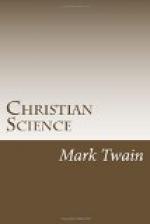“shall be officially controlled by no other church.”
That does not surprise us—we know by the rest of the By-laws that that is a quite irrelevant remark. Yet we do vaguely and hazily wonder why she takes the trouble to say it; why she wastes the words; what her object can be—seeing that that emergency has been in so many, many ways, and so effectively and drastically barred off and made impossible. Then presently the object begins to dawn upon us. That is, it does after we have read the rest of the By-law three or four times, wondering and admiring to see Mrs. Eddy—Mrs. Eddy—Mrs. Eddy, of all persons—throwing away power!—making a fair exchange—doing a fair thing for once more, an almost generous thing! Then we look it through yet once more unsatisfied, a little suspicious—and find that it is nothing but a sly, thin make-believe, and that even the very title of it is a sarcasm and embodies a falsehood—“self” government:
“Local Self-Government. The First Church of Christ, Scientist, in Boston, Massachusetts, shall assume no official control of other churches of this denomination. It shall be officially controlled by no other church.”
It has a most pious and deceptive give-and-take air of perfect fairness, unselfishness, magnanimity—almost godliness, indeed. But it is all art.
In the By-laws, Mrs. Eddy, speaking by the mouth of her other self, the Mother-Church, proclaims that she will assume no official control of other churches-branch churches. We examine the other By-laws, and they answer some important questions for us:
1. What is a branch Church? It is a body of Christian Scientists, organized in the one and only permissible way—by a member, in good standing, of the Mother-Church, and who is also a pupil of one of Mrs. Eddy’s accredited students. That is to say, one of her properties. No other can do it. There are other indispensable requisites; what are they?
2. The new Church cannot enter upon its functions until its members have individually signed, and pledged allegiance to, a Creed furnished by Mrs. Eddy.
3. They are obliged to study her books, and order their lives by them. And they must read no outside religious works.
4. They must sing the hymns and pray the prayers provided by her, and use no others in the services, except by her permission.
5. They cannot have preachers and pastors. Her law.
6. In their Church they must have two Readers—a man and a woman.
7. They must read the services framed and appointed by her.
8. She—not the branch Church—appoints those Readers.
9. She—not the branch Church—dismisses them and fills the vacancies.
10. She can do this without consulting the branch Church, and without explaining.
11. The branch Church can have a religious lecture from time to time. By applying to Mrs. Eddy. There is no other way.




